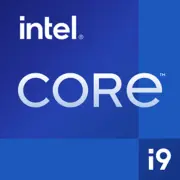Intel Core i9-11900KF

Intel Core i9-11900KF: Full Review of the 2021 Processor in 2025
Introduction
Even four years after its release, the Intel Core i9-11900KF remains an intriguing specimen in processor history. Released in 2021, it marked the last representative of Intel's 14nm era before transitioning to thinner manufacturing processes. By 2025, this CPU is no longer relevant for new builds but may be of interest as a budget solution for upgrading old systems. Let’s explore who might find it useful today.
Key Specifications: Rocket Lake on 14nm
Architecture and Manufacturing Process
The Core i9-11900KF is built on the Rocket Lake-S architecture, which, despite its 14nm manufacturing process (Intel SuperFin), brought several improvements. Notably, it supports PCIe 4.0 (20 lanes) and achieved a 19% increase in IPC (instructions per clock) compared to the previous generation, Comet Lake. However, by 2025, the 14nm technology appears outdated: modern Intel and AMD processors utilize 5–7nm, resulting in better power efficiency and transistor density.
Performance
- 8 cores, 16 threads with a base frequency of 3.5 GHz and boost mode up to 5.3 GHz (Thermal Velocity Boost).
- Geekbench 6: 2317 (Single-Core) / 10783 (Multi-Core). In comparison, the contemporary Ryzen 5 7600X (2023) scores around 2700/13500 but is more expensive.
- L3 cache 16MB — less than its AMD competitors (e.g., Ryzen 7 5800X — 32MB).
Key Features
- Support for AVX-512 — beneficial for niche tasks like encryption or scientific computing.
- Intel Deep Learning Boost — acceleration for AI workloads.
- Unlocked multiplier for overclocking (requires a motherboard with the Z590 chipset).
Compatible Motherboards
Socket and Chipsets
The processor uses LGA 1200, limiting motherboard options to models from the 500 series:
- Z590 — a feature-rich chipset with CPU overclocking, PCIe 4.0, and support for high-speed memory.
- B560/H570 — more affordable options with unlocked memory overclocking (but not CPU).
- H510 — basic boards without PCIe 4.0 and overclocking.
Example Models (2025)
- ASUS ROG Maximus XIII Hero (Z590) — a top-tier board (~$250-300 in 2021, currently around $150-200 on the secondary market).
- MSI MAG B560 Tomahawk — an optimal choice for non-overclocked builds ($120-150).
Tip: In 2025, new boards for LGA 1200 are rarely produced. Look for leftovers in warehouses or second-hand options.
Supported Memory
DDR4 and Limitations
The i9-11900KF works only with DDR4 (up to 3200 MHz in JEDEC mode). With XMP profiles, frequencies of up to 5133 MHz are supported, but stability depends on the motherboard and memory.
Recommendations:
- The optimal choice — DDR4-3600 CL16 (e.g., G.Skill Trident Z).
- For dual-channel mode, use 2 or 4 modules.
Important: DDR5 is not supported, which may be a downside in 2025 as new platforms have transitioned to DDR5.
Power Supply Units: Power Calculation
Power Consumption
- TDP 125W, but under overclocking, consumption can reach 250W (2021 tests).
- Together with a graphics card level RTX 4070 (200W), the system consumes about 450-500W.
Recommendations:
- Minimum 650W (e.g., Corsair RM650x).
- For overclocking and high-end GPUs — 750-850W (Seasonic Focus GX-750).
Tip: Choose power supplies with an 80 Plus Gold certification or higher for efficient cooling and stability.
Pros and Cons
Strengths
1. High gaming performance: With a frequency of up to 5.3 GHz, in 2025, the CPU handles gaming at the level of the Ryzen 5 7600X.
2. PCIe 4.0: Relevant for fast NVMe drives (e.g., Samsung 990 Pro).
3. Availability: In 2025, the price for a new i9-11900KF is around $200-250 (compared to $500 in 2021).
Weaknesses
1. 14nm manufacturing process: High heat output requires a powerful cooler.
2. Only 8 cores: Lags behind Ryzen 7 7700X (8 cores on 5nm) and Ryzen 9 7900X (12 cores) in multi-threaded tasks.
3. No DDR5 and PCIe 5.0: The platform lacks future upgrade potential.
Usage Scenarios
Gaming
In 2025, the i9-11900KF still handles AAA titles in conjunction with a GPU level RTX 4060 Ti or RX 7700 XT. For example, in Cyberpunk 2077 (1440p, Ultra) it achieves ~80-90 FPS.
Work Tasks
- Photo Editing: Adobe Photoshop and Lightroom operate without lag.
- Programming: Code compilation in Visual Studio or JetBrains IDE is comfortable.
- Rendering: In Blender or Cinema 4D, 8 cores are sufficient for small projects, but for complex scenes, Ryzen 9 is preferable.
Multimedia
Streaming via OBS is possible, but when using NVENC (encoding through the GPU), the CPU load remains minimal.
Comparison with Competitors
AMD Ryzen 7 5800X (2020)
- AMD Advantages: 7nm, less heat, 32MB L3 cache.
- Disadvantages: Frequency up to 4.7 GHz; in gaming, i9-11900KF is 5-10% faster.
Intel Core i5-13600K (2023)
- i5 Advantages: 14 cores (6P+8E), DDR5, price ~$300.
- Conclusion: i5-13600K outperforms in all areas except for P-core frequency (up to 5.1 GHz).
Practical Assembly Tips
1. Cooling: A tower cooler (Noctua NH-D15) or AIO (240mm, e.g., Arctic Liquid Freezer II) is essential.
2. Motherboard: For overclocking — ASUS Z590; for budget builds — MSI B560.
3. Memory: 32GB DDR4-3600 is optimal for gaming and multitasking.
4. Case: Good ventilation (Lian Li Lancool 216), minimum 3 fans.
Final Verdict: Who Is the i9-11900KF Suitable for in 2025?
This processor should be considered only in two cases:
1. Upgrading an old system on LGA 1200 (e.g., from a Core i5-10400F).
2. Budget gaming build, where you can buy the CPU for $200 and save on other components.
For new PCs in 2025, it’s better to choose modern platforms (AM5 or LGA 1851), but if you need a "budget monster" for gaming — the i9-11900KF can still impress.
Basic
CPU Specifications
Memory Specifications
GPU Specifications
Miscellaneous
Benchmarks
Compared to Other CPU
Share in social media
Or Link To Us
<a href="https://cputronic.com/cpu/intel-core-i9-11900kf" target="_blank">Intel Core i9-11900KF</a>